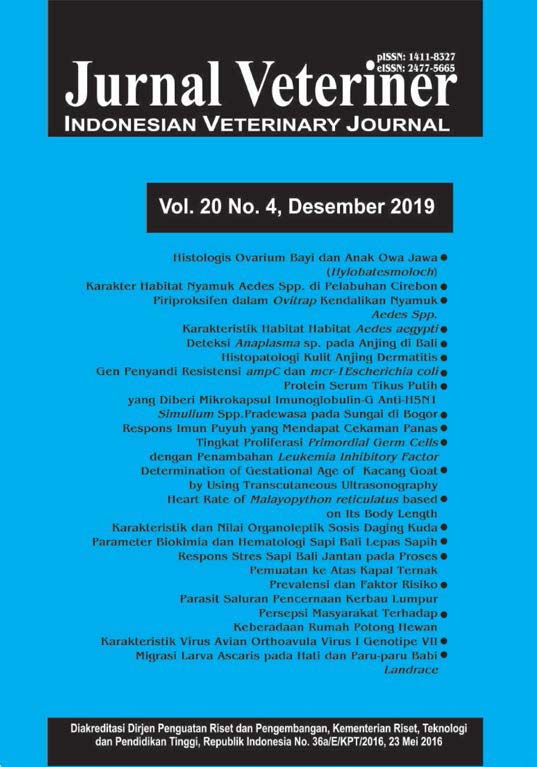Tingkat Proliferasi Primordial Germ Cells secara In Vitro dalam Medium Kultur dengan Penambahan Leukemia Inhibitory Factor (IN VITRO PROLIFERATION RATE OF MICE PRIMORDIAL GERM CELLS IN THE CULTURE MEDIUM WITH ADDITION OF LEUKEMIA INHIBITORY FACTOR)
Abstract
Primordial germ cells (PGCs) are precursors for gamete cells. The totipotency of PGCs allows them to be used as a model for studying cancer and infertility. The study aimed to examine the characteristics of the mice fetus as a source of PGCs, proliferation rate of PGC and the role of LIF in vitro culture of PGCs. This study used genital ridges from 26 fetuses at 13.5 days post-coital (dpc) to isolate the PGCs. Genital ridges dissociation using 0.1% of trypsin and in vitro culture was carried out using the Dulbecco Modified Eagle Medium (DMEM) and incubated at 37 0C and 5% CO2 atmosphere. The fetus was measured and weighed to determine the normal development of the fetus and continued with the identification of the genital ridges after laparotomy performed under a stereomicroscope. Proliferation rate was measured by calculating Population Doubling Time (PDT), and cell viability was observed after in vitro culture for six days. The effect of adding 1000 IU/ml of leukemia inhibitory factor (LIF) was evaluated from two types of treatment in the medium, 1) DMEM added with 15% of fetal calf serum (FCS) (DMEM + S15%) and 2), DMEM was supplemented with 15% of FCS and 1000 IU/ml LIF (DMEM + S15% + LIF1000 IU/ml). Immunohistochemistry staining was carried out on the third-, sixth- and ninth-day of culture to detect the expression of Oct-4 in the PGCs, then cells were counted. The results showed that the fetus as a source of PGCs had normal development. The fetal sizes were 11 mm, and male and female genital ridges could be distinguished by morphology at the age of 13.5 dpc. The proliferation of PGCs was relatively slow with a 1.3 day PDT value with the viability of around 85%. Culture of PGCs with DMEM + S15% treatment showed the percentage of PGCs that expressing Oct-4 decreased from the third day of culture to the ninth day of culture. The culture of PGCs in DMEM + S15% + LIF 1000 IU / ml treatment showed that the percentage of PGCs that expressed Oct 4 increased on the sixth day of culture and decreased on the ninth day of culture. It can be concluded that the addition of LIF can maintain the number of PGCs until the sixth day of culture. LIF is thought to play a role in the regulation of proliferation of PGCs through receptors of LIF (RLIF) and glicoprotein (gp) 130 receptors.



















